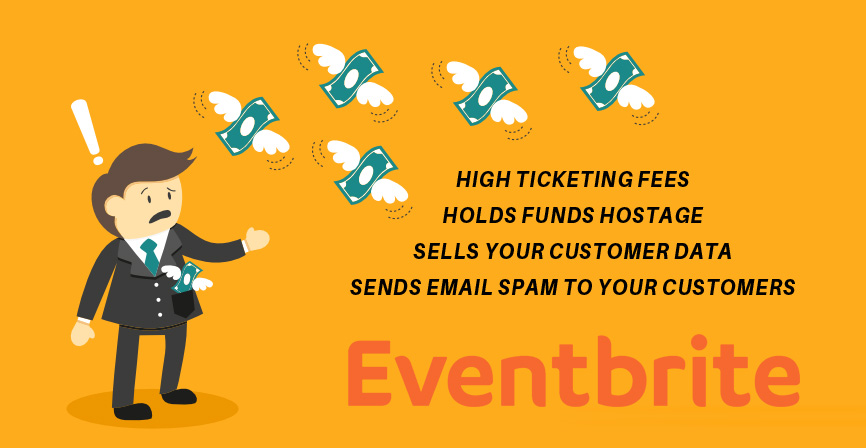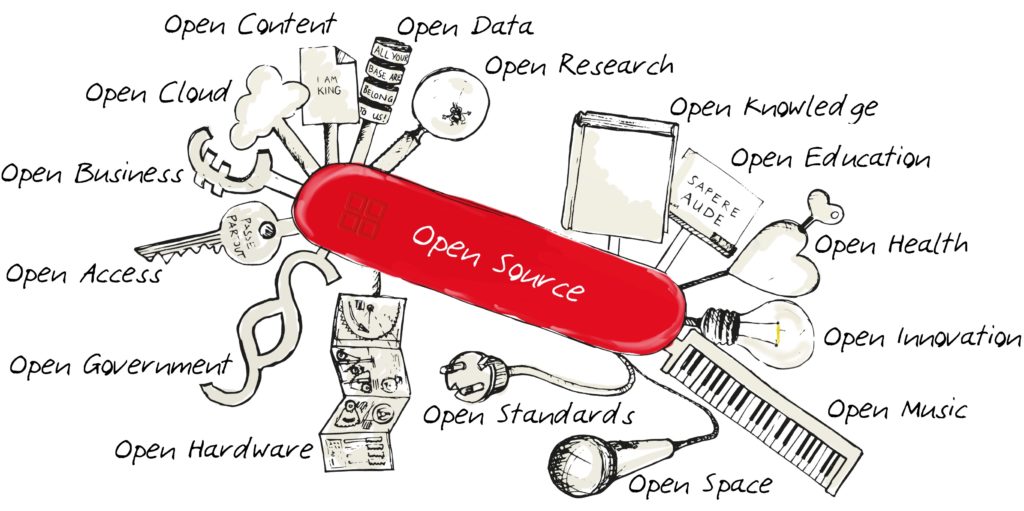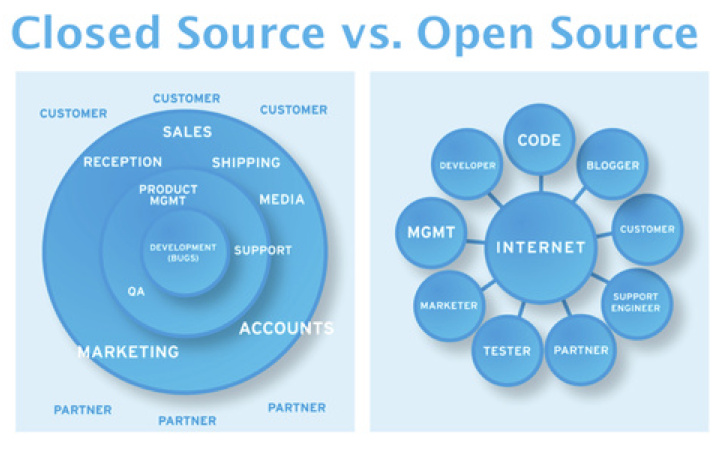Since Eventbrite has increased its ticketing fees recently, the team at Event Espresso has seen an influx of non-profit customers coming over from the platform. This post outlines some of the ways Event Espresso and WordPress are helping event managers overcome ticketing fees while gaining more autonomy and value in the process. As a bonus, I discuss the differences between closed source and open source event ticketing solutions.

Eventbrite Fleeces Non-profit Customers with Ticketing Fees
As you probably are aware, Eventbrite charges a fee and makes a profit on every ticket you sell from their platform. For many years, the only advantage that Eventbrite has over a premium WordPress ticketing platform, such as Event Espresso, is their no-fee ticketing for free events. That set up works great for not-for-profit organizations that only run free events and rely heavily on sponsorships. However, many non-profit customers need or want to sell tickets to their activities but incur heavy ticketing fees when doing so, which is not a good feeling, especially when funds are already tight.

Now that Eventbrite has nearly doubled their ticket fees, many non-profit organizations are feeling the pinch. Just take a look at the Eventbrite Fee schedule as of October 30, 2017:
Eventbrite Service Fee — Varies by package. In the U.S., you have
– Essentials Package: 1% of the ticket price + $0.99 per paid ticket (maximum Service Fee: $19.95)
– Professional Package: 2.5% of the ticket price + $1.99 per paid ticket (maximum Service Fee: $24.95)
– Premium Package: custom pricing
But that’s not it. On top of the ticketing fees you’ve incurred, you have to consider your transaction fees, which are not exactly cheap, no matter what. Don’t believe me? Just take a look at this:
Eventbrite Payment Processing fee — Varies by package. In the U.S., you have
– Essentials + Professional Packages: 3% of the total transaction (no maximum fee)
– Premium Package: custom pricingIf you use PayPal or Authorize.Net to collect payments, the Eventbrite Service Fee is the same. You pay their fees outside of Eventbrite.
Is your pocketbook hurting yet?
I recently heard a story while at WordCamp Las Vegas about a non-profit organization that was paying out over $300 a month in ticketing fees to Eventbrite. That was before the recent price increase. I can imagine they are probably paying much more than that now. I know from experience that most non-profit organizations cannot absorb a substantial price increase. Heck, even many for-profit event companies are suffering the of Eventbrite fees, as seen in the story I posted on the Event Espresso blog earlier this year, where a quilting events company was throwing away over $21,000 in fees every year on the Eventbrite platform.
Non-profit Organizations Rejoice with Zero Fee Ticketing from Event Espresso
Many non-profit organizations are also getting excited about the zero fee ticketing platform, Event Espresso. Here’s what one non-profit customer had to say about Event Espresso recently:
For the past 5.5 years we have used Eventbrite to support our year-round programs from class registrations to ticket sales to fundraising. The platform hasn’t met all of our needs, specifically integrating with our website. And Eventbrite recently announced a significant increase in their fees – an increase that, as a nonprofit, we simply can’t absorb or pass on to our theater families. We are desperate to find a better solution! We are very impressed with your application particularly because it integrates with our WordPress site, allows us to use our InTuit, Quickbooks for payment processing and allows us to add only the features we need.
Through Eventbrite we were charged .99 +1% for every transaction PLUS 3% credit card processing. We were notified today that we would be charged $1.99 + 2.5% plus 3%. NOT cool! I LOVE that your platform appears to be a reasonable annual fee. I know I will pay the 3% for credit card processing through Quickbooks, but I would have to pay that no matter what. And I especially LOVE that I can use our credit card processor. We’ve been trying to eliminate multiple processors.
Event Espresso gives users the option to register for multiple events in one transaction. Eventbrite was never able to offer this feature. We offer many programs and have lots of clients who like to register for multiple programs.
I don’t know about you, but hearing stories like this one put a great big smile on my face. By coming over to Event Espresso, or any one of the many great event plugins for WordPress, non-profit organizations can save a tremendous amount of money in ticketing fees over Eventbrite every year. Just imagine how much money your non-profit organization will save with Event Espresso and WordPress. Of course, you will still see transaction fees, there’s no getting away from those, but at least you can say goodbye to ticketing fees.
What’s the Price of Running Event Espresso and WordPress?
Shall we take a look at how much it costs to run your event ticketing website with these excellent, open source platforms? Let’s break it down.
The price for decent hosting for WordPress varies wildly, so you can expect to pay around $100 per year for a suitable web host. Then figure in the cost of Event Espresso 4, which costs about as much as one month of Eventbrite ticketing, before the price increase, coming in at $299 for the first year. Finally, add in a theme for $60, and you’re looking at around $460 (or less) to own your event ticketing website, for the first year. That includes customizable and printable tickets, attendance tracking apps, multiple event registrations, Infusionsoft and MailChimp integration, and your choice of payment processing.
So that comes to just under $500 per year. As a bonus, you own your event and customer data. However, if you happen to be a non-profit organization, the deal sweetens with a discount for non-profits. All they have to do is apply and prove they are a not-for-profit to receive a discount of up to 20% off the first year of support and updates.
See for yourself using the Eventbrite fees calculator tool that Event Espresso has created, which can help you estimate how much money you’ll save selling tickets using their open source technology.
Zero Fee Event Ticketing on the Cloud with Event Smart
We’ve got you covered with Event Smart, the cloud-based, zero fees, event ticketing platform that’s powered by Event Espresso and WordPress.
Yes, you heard that right, Event Smart is a zero fee, event ticketing platform on the cloud, powered by the open source software, Event Espresso, and WordPress. Event Smart is the perfect solution for non-profit organizations that need a complete event ticketing website, right out-of-the-box, and includes many of the same features you see with Eventbrite.
Only Pay for the Features you Need or Want
With both of the Event Espresso and Event Smart ticketing platforms, users only pay for the features they need or want, on a monthly or yearly basis, while paying nothing in ticketing fees. In my opinion, this is a great thing for non-profit event managers worldwide, as they can fully embrace the autonomy and value of both platforms, for small monthly or yearly fee, rather than throwing away money on ticketing fees to pay for features you don’t need or want.
Open Source vs Closed Source Event Ticketing
Open source software (OSS) is distributed under a licensing agreement which allows computer code to be shared, viewed and modified by other users and organizations.

Or in slightly more user-friendly language, open source software is available for the general public to use and modify from its original design free of charge. What it means is that a piece of software can evolve and be iterated upon by other developers anywhere in the world. Ideally, this means that the software is improved over time, but it can often take plenty of interesting twists and turns with all of that evolution and can change form and shape entirely.
Right then. So what is Closed Source?
Closed source software can be defined as proprietary software distributed under a licensing agreement with authorized users with private modification, copying, and republishing restrictions.
Or in layman terms, the source code is not shared with the public for anyone to look at or change. Closed source is the opposite of open source. Thanks, Wikipedia 😉
Closed source is actually the sort of arrangement that you would expect from most businesses, protective of their product and keen to maintain control over their brand and the user experience offered to their customers. Think Apple rather than Android.
The infographic below describes perfectly the difference between closed source and open source platforms.

Don’t Rely on Closed Source Technology to be Around Forever
Now imagine if that closed source software you’ve come to rely on shuts down. Where did all of your sales data and registration disappear to? Chances are, that data is gone forever, just as some Eventbrite customers selling tickets to a Cannabis Film Festival found out recently when Eventbrite shut down their ticket sales and held the ticketing fees. Seriously, it was so insane that Forbes reported on the article here.
“First of all, they have money that I’m owed for tickets I sold,” said Zaytsev. “Forget cannabis, this is no way to treat a customer with a 3-year relationship with [the company].”
As to why the event platform would suddenly take issue with the film festival, Zaytsev surmises that it may be due to a reference of CBD-infused popcorn. CBD is a non-psychoactive cannabinoid that is produced by both marijuana and industrial hemp. While the legality of CBD is disputed, there are scenarios in which selling hemp-derived CBD could be legal under federal law.
I’m not condoning the use of illicit drugs here, and frankly, I don’t care about your views on recreational drugs. However, what I do take issue with is the fact that Eventbrite, or any of the big event ticketing platforms, can shut down your event business in the blink of an eye, without even giving you a reason. I don’t know about you, but I think that could be a devastating blow to many non-profit, as well for-profit organizations.
Event Ticketing Powered by Open Source Technology
Unlike the too-big-to-fail, closed system, event behemoths, like Eventbrite, cVent, Ticketfly, and TicketMaster, event ticketing systems powered by Event Espresso and WordPress are wholly based on open source technology, where developers can access core files, create customizations, and build integrations with other platforms. If you can dream it, an Event Espresso Pro developer can make it.
In Summary
Everyone is welcome in the open source community, regardless of background.
Don’t be fooled by the ease of use and flexibility of Eventbrite, cVent, and Ticketfly, without considering the safety of your event and registration data, ticketing fees, and lack of autonomy and profitability. Just because you can create events and sell tickets with ease on these platforms, ultimately, you are not in control, and risk losing valuable business data and reputation on closed source platforms, where you are held captive by their ever-increasing fees, while your customer data is farmed out to the highest bidder and you are both bombarded with followup marketing emails.
When you put all your eggs in one basket with Eventbrite, you are at their mercy. Open source isn’t going to kill Eventbrite anytime soon but if they aren’t careful, open source solutions will catch up and start taking a larger market share, just as WordPress has done over the years. So ditch the closed source event ticketing platforms and enjoy the autonomy and profitability of owning and running your event ticketing website by migrating to Event Espresso or Event Smart, today.
On behalf of the Event Espresso and Event Smart teams, we welcome you with open arms and zero event ticketing fees, for life.


[…] the rights it provides users. So, it saddens us to see closed-source platforms, such as Eventbrite, increasing their fees, even for their non-profit […]